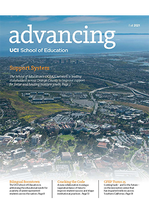Cracking the Code
A new collaboration between the UCI School of Education and other UCI campus leaders is using a superabundance of data to improve student success and shape institutional practices.
Widely regarded as a national leader in utilizing sophisticated data to improve student success, the University of California, Irvine bolstered its stature further this summer with the establishment of the Collaboratory for Data Analytics for Student Success (CODAS).
CODAS brings together leaders from the UCI School of Education, the UCI Education Research Initiative, the UCI Office of the Vice Provost for Teaching and Learning and more to support instructors in the collection and analysis of quantitative and qualitative data from within UCI.
CODAS will use a cornucopia of data to improve student learning and outcomes and to develop and deploy cutting-edge measures to understand the student experience and support student success.
Its research will not only focus on UCI undergraduates, but will be shared out to higher education administrators across the nation, including community colleges.
“CODAS will not just be a traditional academic research center that generates findings for the field as a whole, but one that also inspires the shaping of internal institutional practices and improves performance,” said Richard Arum, dean and professor, UCI School of Education and co-principal investigator of CODAS. “Combining the world-class research of its participants with UCI professors who are already working to improve teaching in their particular fields and disciplines makes this collaborative unique, and it will serve as a model to colleges across the nation.”
CODAS brings together leaders from the UCI School of Education, the UCI Education Research Initiative, the UCI Office of the Vice Provost for Teaching and Learning and more to support instructors in the collection and analysis of quantitative and qualitative data from within UCI.
CODAS will use a cornucopia of data to improve student learning and outcomes and to develop and deploy cutting-edge measures to understand the student experience and support student success.
Its research will not only focus on UCI undergraduates, but will be shared out to higher education administrators across the nation, including community colleges.
“CODAS will not just be a traditional academic research center that generates findings for the field as a whole, but one that also inspires the shaping of internal institutional practices and improves performance,” said Richard Arum, dean and professor, UCI School of Education and co-principal investigator of CODAS. “Combining the world-class research of its participants with UCI professors who are already working to improve teaching in their particular fields and disciplines makes this collaborative unique, and it will serve as a model to colleges across the nation.”
A WEALTH OF DATA
CODAS is the byproduct of several pre-existing data sets at UCI.
The first comes from the School of Education’s Next Generation Undergraduate Success Measurement Project, also known as the UCI Measuring Undergraduate Success Trajectories project (UCI-MUST). Supported by the Andrew W. Mellon foundation and led by Arum, the project seeks to improve the understanding of the value of undergraduate educational experiences and promote evidence-based models of undergraduate student success. Over the past two years, the project’s research team has tracked a random sample of two cohorts, each with more than 1,200 UCI undergraduates. Data is being collected in three different strands, each overseen by a School of Education faculty member. Everything from transcripts to online classroom behavior, living situations to student moods is being considered.
CODAS also utilizes the work of the UCI Education Research Initiative. Established in 2018, the ERI is a multidisciplinary community that seeks to improve the educational experiences of UCI undergraduates, particularly underrepresented minorities, first-generation and low-income students. The ERI has a research mission that identifies and disseminates interventions, instructional practices and policies
to increase postsecondary success and reduce racial inequality, and an implementation mission that supports and facilitates the application of research into practice.
The first comes from the School of Education’s Next Generation Undergraduate Success Measurement Project, also known as the UCI Measuring Undergraduate Success Trajectories project (UCI-MUST). Supported by the Andrew W. Mellon foundation and led by Arum, the project seeks to improve the understanding of the value of undergraduate educational experiences and promote evidence-based models of undergraduate student success. Over the past two years, the project’s research team has tracked a random sample of two cohorts, each with more than 1,200 UCI undergraduates. Data is being collected in three different strands, each overseen by a School of Education faculty member. Everything from transcripts to online classroom behavior, living situations to student moods is being considered.
CODAS also utilizes the work of the UCI Education Research Initiative. Established in 2018, the ERI is a multidisciplinary community that seeks to improve the educational experiences of UCI undergraduates, particularly underrepresented minorities, first-generation and low-income students. The ERI has a research mission that identifies and disseminates interventions, instructional practices and policies
to increase postsecondary success and reduce racial inequality, and an implementation mission that supports and facilitates the application of research into practice.
|
In July 2022, Associate Professor Ben Castleman will join the UCI School of Education. Castleman is currently the Newton and Rita Meyers Associate Professor in the Economics of Education at the University of Virginia and founder and director of the NUDGE⁴ Solutions Lab.
NUDGE⁴, which will be brought to UCI and serve as a prominent feature of CODAS, works with public agencies and organizations to design and test strategies to improve educational and workforce success for lower-income and traditionally underrepresented populations. The solutions developed draw on insights from behavioral economics and data science approaches to support people to pursue well-aligned educational and career pathways. School of Education Professor Mark Warschauer recently completed a five-year, $2.5 million National Science Foundation-funded grant, Investigating Virtual Learning Environments, which analyzed survey, clickstream, and learner outcome data from tens of thousands of students in hundreds of online classes to understand and support students’ online learning. This data will also be leveraged in CODAS. CODAS is working with the UCI Office for Data and Information Technology for the data analytics platform. In addition to these data streams, the existing research of several professors will be folded into CODAS. |
Higher Education Leadership Meets Innovating: Teaching and Learning in a Data Driven EraCODAS is the host to an annual weeklong institute designed for higher education leaders who want to understand and use the latest in pedagogical advances and new instructional technology in their universities. Offered by the School of Education and co-sponsored by the Office of the Vice Provost for Teaching and Learning Innovation and assisted by the Division of Continuing Education, the inaugural institute, hosted in September, developed in participants a new understanding of the ways that data can be used to assess and improve teaching and learning; shared the latest research and practice in pedagogical advances and how they can be used to improve undergraduate and graduate instruction; and provided guidance to leaders as to how to introduce change related to pedagogy in a university. Stay connected with the UCI School of Education for news on the next institute, coming summer 2022. |
USING DATA TO INFORM PRACTICE
|
CODAS is set up to be both an internal- and external-facing organization. For the former, CODAS will generate detailed reports on student experience and learning outcomes, which could be used in myriad ways.
For example, the ERI awards “mini grants” to promote and support UCI faculty working on improving instruction in their area. According to Brian Sato, ERI director, professor of teaching, School of Biological Sciences and associate dean, Division of Teaching Excellence and Innovation, data from CODAS can aid in supplementing and enhancing faculty projects, and result in a new pool of potential collaborators. “CODAS’ work to provide greater access to various types of institutional data will greatly enhance the potential projects being undertaken by ERI,” Sato said. “UCI is already at the forefront of data access and utilization to improve teaching and learning, and CODAS’ efforts will push the envelope even further.” As detailed previously, CODAS will utilize multiple data sets. Simply identifying and determining which data to use can be beneficial to improving instruction and student outcomes. |
|
“One of the challenges with leveraging data for student outcomes is understanding which data to use,” said Michael Dennin, vice provost of teaching and learning; dean, Division of Undergraduate Education; and co-principal investigator of CODAS. “The advantage of CODAS is combining the research on what data is most useful with research on how best to utilize the data once it is identified. CODAS then allows us to turn that research into practice in a way that is truly impactful.”
CODAS can also conduct targeted research on campus to support larger institutional goals, such as the accreditation process. “We’re not just working to improve institutional performance in general, but are working to provide concrete assistance in supporting processes, such as accreditation, that ask institutions to rigorously assess undergraduate experiences and outcomes,” Arum said. “With CODAS, we will be able to do it in a way that’s much more sophisticated than any other university in the country today.” |
SUPPORTING HIGHER EDUCATION
Externally, CODAS will reach out to and support data analytics for student success at other institutions of higher education across the state and nation. This includes supporting instruction and improving student outcomes at community colleges, which educate a high percentage of underrepresented students, and which serve as a major gateway for such students to transfer to the University of California.
“Community colleges are a key institution in supporting broad access to higher education,” Arum said. “Higher education as a whole needs to improve, but if you’re concerned with equity and inclusion, community college needs are critically important.”
Associate Professor Di Xu’s research focuses on online learning, community colleges, instructor productivity and more. Xu and ERI have been in conversation with local community colleges to better understand policies and to identify what research can be conducted collaboratively. CODAS will allow current research to be disseminated to community colleges, and for researchers to better understand the challenges students are facing, which can in turn inform new research.
Xu is also hopeful that new partnerships with UCI can be forged, and that the work will eventually facilitate interventions.
“So far, our work is exploratory, but these exploratory studies could inform the next generation of interventions,” Xu said. “Interventions involve partners much more strongly, so having CODAS, which provides support for researchers and practitioners, will serve as a great resource for facilitating interventions.”
Through the NUDGE⁴ Lab, Castleman is leading a project focused on increasing community college student transfer rates. Using the same machine learning strategies that Netflix uses to recommend movies and TV shows, Castleman and his team designed an algorithm that provides students with personalized recommendations of courses that fulfill degree and transfer requirements and that maximized their predicted probability of academic success.
“I am very excited to explore ways that the combination of research-policy partnerships, behavioral economics insights, and data science strategies can be applied to improve educational success and workforce transitions for UCI students as well as to support broader educational and economic equity across California,” Castleman said.
CODAS also seeks to serve as a model for other four-year institutions interested in better understanding its student body and improving teaching and learning outcomes, as well as more equitable opportunities for underrepresented students.
“CODAS provides a structure and framework for bringing together the different elements of a university that are necessary for supporting students as broadly as possible,” Dennin said. “Also, for universities that do not have the resources of CODAS, we have a vision by which CODAS ultimately can provide support for other institutions.”
“I hope that the work being undertaken by CODAS is widely disseminated and adopted by universities and researchers across the world,” Sato said. “By creating additional metrics by which we consider student success, as opposed to relying solely on GPA and graduation rates, we will have a much better understanding of the student experience, and thus be able to consider ways to holistically improve this experience. By changing how we view and measure student success, we will hopefully be able to create a more diverse and equitable higher education landscape.”
“Community colleges are a key institution in supporting broad access to higher education,” Arum said. “Higher education as a whole needs to improve, but if you’re concerned with equity and inclusion, community college needs are critically important.”
Associate Professor Di Xu’s research focuses on online learning, community colleges, instructor productivity and more. Xu and ERI have been in conversation with local community colleges to better understand policies and to identify what research can be conducted collaboratively. CODAS will allow current research to be disseminated to community colleges, and for researchers to better understand the challenges students are facing, which can in turn inform new research.
Xu is also hopeful that new partnerships with UCI can be forged, and that the work will eventually facilitate interventions.
“So far, our work is exploratory, but these exploratory studies could inform the next generation of interventions,” Xu said. “Interventions involve partners much more strongly, so having CODAS, which provides support for researchers and practitioners, will serve as a great resource for facilitating interventions.”
Through the NUDGE⁴ Lab, Castleman is leading a project focused on increasing community college student transfer rates. Using the same machine learning strategies that Netflix uses to recommend movies and TV shows, Castleman and his team designed an algorithm that provides students with personalized recommendations of courses that fulfill degree and transfer requirements and that maximized their predicted probability of academic success.
“I am very excited to explore ways that the combination of research-policy partnerships, behavioral economics insights, and data science strategies can be applied to improve educational success and workforce transitions for UCI students as well as to support broader educational and economic equity across California,” Castleman said.
CODAS also seeks to serve as a model for other four-year institutions interested in better understanding its student body and improving teaching and learning outcomes, as well as more equitable opportunities for underrepresented students.
“CODAS provides a structure and framework for bringing together the different elements of a university that are necessary for supporting students as broadly as possible,” Dennin said. “Also, for universities that do not have the resources of CODAS, we have a vision by which CODAS ultimately can provide support for other institutions.”
“I hope that the work being undertaken by CODAS is widely disseminated and adopted by universities and researchers across the world,” Sato said. “By creating additional metrics by which we consider student success, as opposed to relying solely on GPA and graduation rates, we will have a much better understanding of the student experience, and thus be able to consider ways to holistically improve this experience. By changing how we view and measure student success, we will hopefully be able to create a more diverse and equitable higher education landscape.”
The CODAS Team
Faculty, staff and professors of teaching involved in CODAS:
|
Nancy Aguilar-Roca, Associate Professor of Teaching, School of Biological Sciences
Richard Arum, Dean and Professor, School of Education; Co-Principal Investigator, CODAS Rachel Baker, Associate Professor, School of Education Suzanne Bohlson, Professor of Teaching, School of Biological Sciences Natascha Buswell, Co-Director, Education Research Initiative Gustavo Carlo, Professor, School of Education Anita Casavantes-Bradford, Associate Professor, School of Social Sciences, Dept. of Chicano/Latino Studies Benjamin Castleman, Associate Professor, School of Education Quoc-Viet Dang, Assistant Professor of Teaching, Henry Samueli School of Engineering Chris Davis, Associate Professor of Teaching, Mathematics Department Michael Dennin, Vice Provost of Teaching and Learning; Dean, Division of Undergraduate Education; Co-Principal Investigator, CODAS Mine Dogucu, Assistant Professor of Teaching, Department of Statistics Nia Dowell, Assistant Professor, School of Education Qian Du, Assistant Professor of Teaching, School of Humanities Jacquelynne Eccles, Distinguished Professor, School of Education Vertical Divider
|
Jutta Heckhausen, Professor of Psychological Science, School of Social Ecology
Angela Jenks, Associate Professor of Teaching, Department of Anthropology Pavan Kadandale, Assistant Professor of Teaching, School of Biological Sciences Christine King, Assistant Professor of Teaching, Henry Samueli School of Engineering Daniel Knight, Assistant Professor of Teaching, Henry Samueli School of Engineering Renee Link, Associate Professor of Teaching, Department of Chemistry Fernando Rodriguez, Assistant Professor of Teaching, School of Education Brian Sato, Director, UCI Education Research Initiative; Professor of Teaching, School of Biological Sciences; Associate Dean, Division of Teaching Excellence and Innovation Laura Tucker, Associate Director, Education Research Initiative Mark Warschauer, Professor, School of Education Adrienne Williams, Associate Director, Education Research Initiative Charles Wright, Associate Professor, Cognitive Sciences, School of Social Sciences Di Xu, Associate Professor, School of Education; Co-Director, Education Research Initiative |




